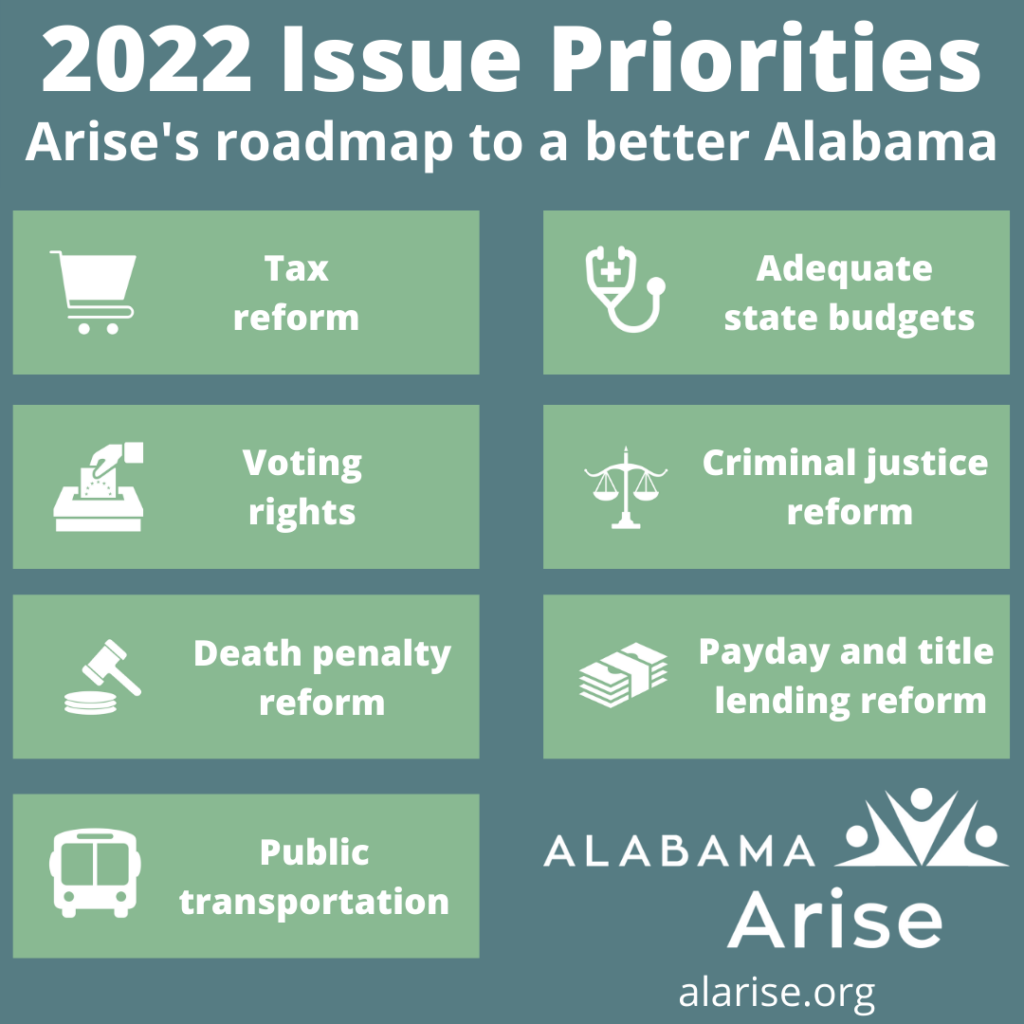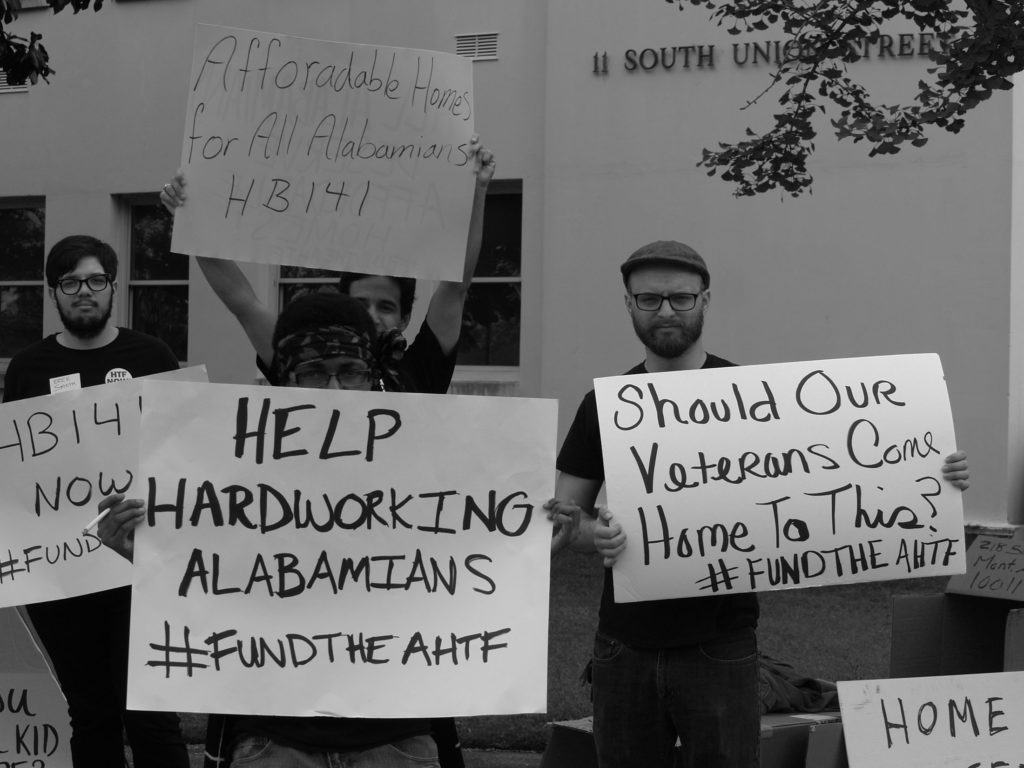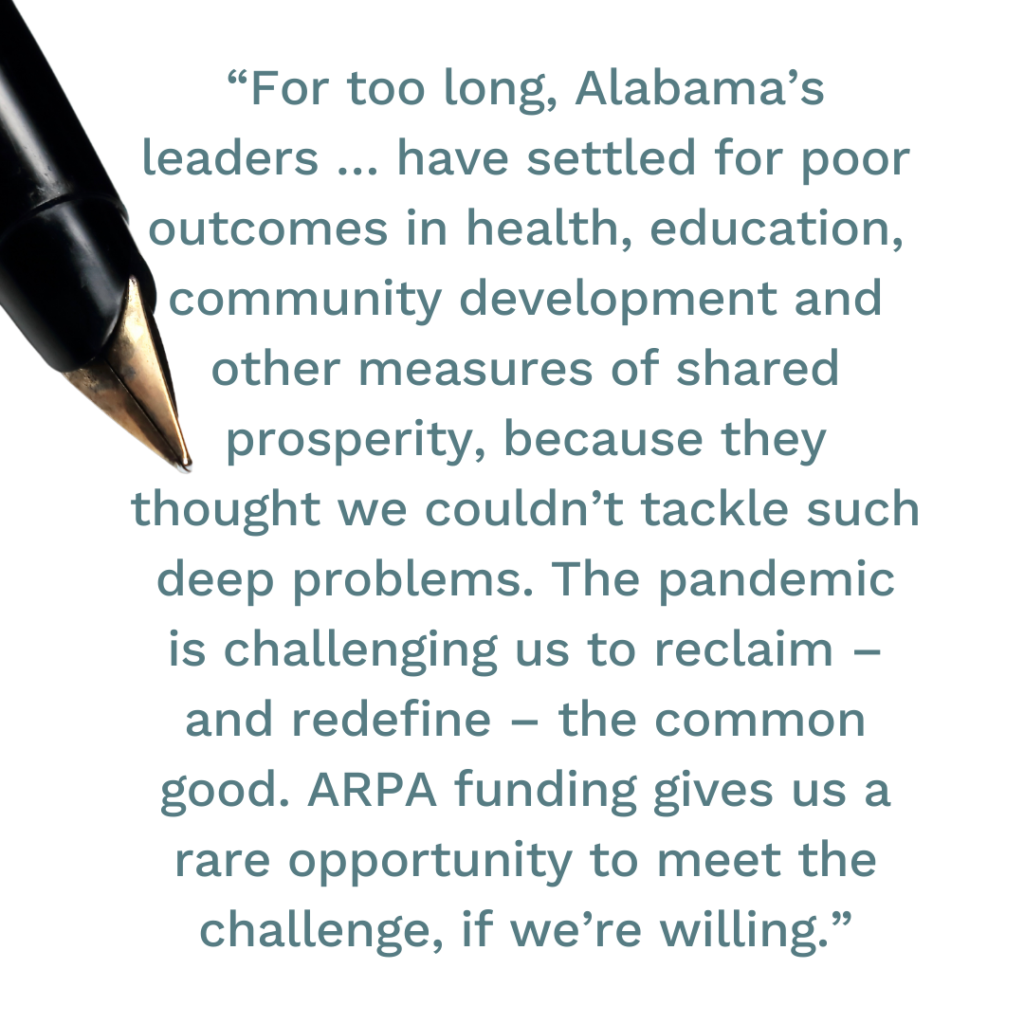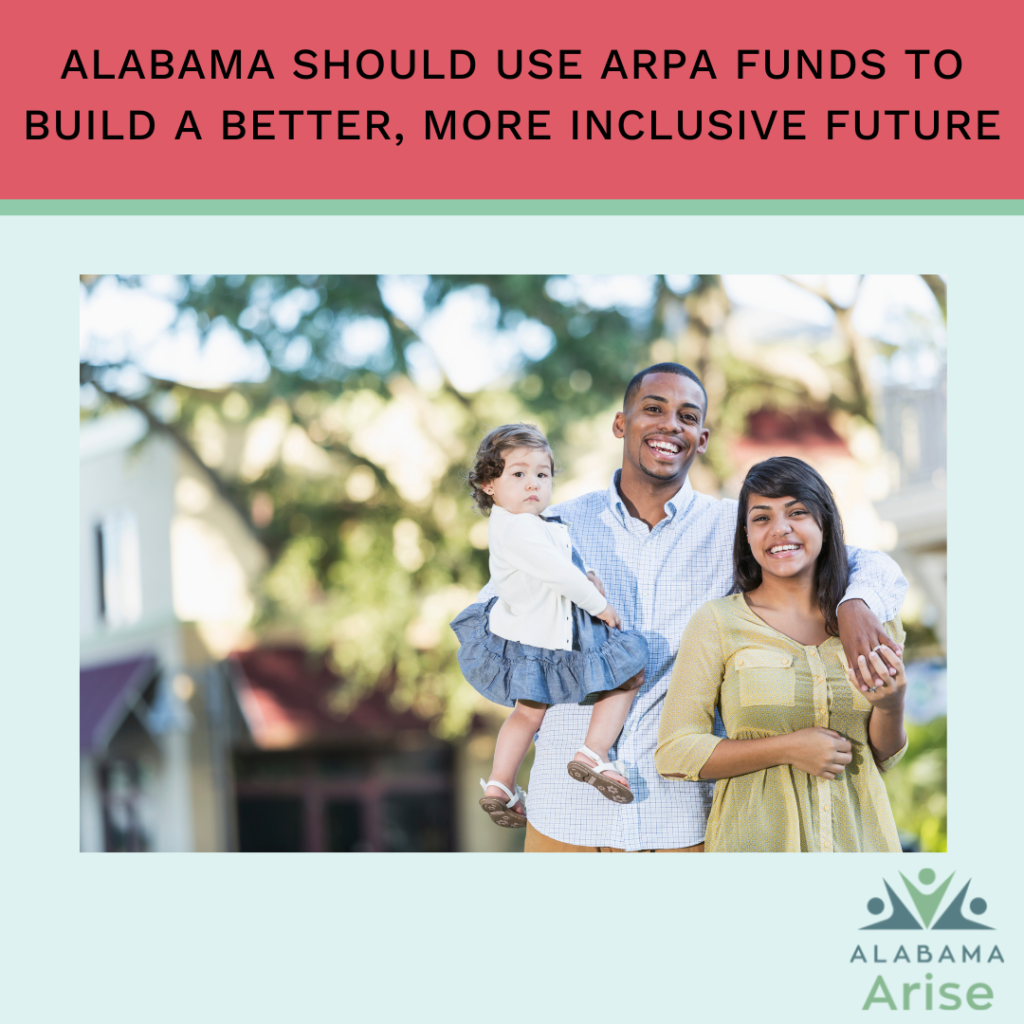The Alabama Legislature is back in session, and Alabama Arise will keep a close eye on policy developments in the coming months. Arise’s Carol Gundlach previews the state budgets and discusses the rare opportunity our lawmakers have to create a more equitable Alabama using federal relief funds.
Issue: Budgets
Six ways Alabama should use ARPA funds to build a better, more inclusive future
The Alabama Legislature’s 2022 regular session, which began Tuesday, will be unusual in one important way. For the first time in many years, Alabama has more than enough revenue to maintain its bare-bones public services. That means instead of scrambling to avoid cuts, the legislative focus can be on strengthening investments in our state’s future.
Both the Education Trust Fund (ETF) budget and the General Fund (GF) budget, which funds non-education programs, have seen tax revenues rise more than 10% in the last year. ETF revenues actually increased 16% in 2021. In addition, Alabama has about $1.6 billion of federal relief funds remaining under the American Rescue Plan Act (ARPA). President Joe Biden signed ARPA into law in March 2021.
Alabama lawmakers already allocated $480 million of the state’s ARPA money last year. Of that amount, $400 million went toward prison construction and $80 million went to hospitals and nursing homes.
Budget growth faces sustainability challenges
State budget officials have steadily cautioned lawmakers to consider the one-time nature of both relief money and the bump in tax revenues. Recent revenue growth almost certainly will not be sustained in future years, budget officials warn. And one-time ARPA funds are by definition only temporary.
Alabama’s budget officials have strongly recommended that both ARPA funds and increased state revenues be invested in programs and services that won’t require regular, recurring revenue but that still meet critical needs for the people of the state. Alabama Arise questions whether the new revenue is as unsustainable as budget officials predict. But Arise agrees that this money needs to fund big ideas that will benefit the state for years to come.
Areas for investment
If spent wisely, ARPA funds could create vital long-term improvements for Alabamians. Alabama Arise has numerous specific suggestions for what those big ideas, and investments, could be.
Serve underserved communities
 ARPA investments should focus on the most underserved areas and most underserved Alabamians. Communities of color and communities with low incomes, particularly in the Black Belt, have long-festering unmet infrastructure needs. The lack of wastewater treatment, accessible broadband internet, affordable housing and public transportation has held these communities back for decades.
ARPA investments should focus on the most underserved areas and most underserved Alabamians. Communities of color and communities with low incomes, particularly in the Black Belt, have long-festering unmet infrastructure needs. The lack of wastewater treatment, accessible broadband internet, affordable housing and public transportation has held these communities back for decades.
In deciding where to spend new one-time dollars, the most historically neglected parts of Alabama should come first. An urgent public health need in many rural Black Belt counties is for sewer and other water treatment systems. These should be a top priority.
Modernize state technology
 A major lesson from the COVID-19 recession was that Alabama’s technology infrastructure is totally inadequate for remote access to services. Suddenly unemployed people desperately tried to apply for unemployment insurance (UI) benefits, food assistance, COVID-19 tests and other services on overwhelmed state computer and telephone systems. People who had never before applied for public assistance couldn’t find one-stop sources of information about services for which they might be eligible. And when new federal programs were created, they were hard to implement. That’s because Alabama’s computer systems didn’t talk to each other and couldn’t share information needed to help people get assistance.
A major lesson from the COVID-19 recession was that Alabama’s technology infrastructure is totally inadequate for remote access to services. Suddenly unemployed people desperately tried to apply for unemployment insurance (UI) benefits, food assistance, COVID-19 tests and other services on overwhelmed state computer and telephone systems. People who had never before applied for public assistance couldn’t find one-stop sources of information about services for which they might be eligible. And when new federal programs were created, they were hard to implement. That’s because Alabama’s computer systems didn’t talk to each other and couldn’t share information needed to help people get assistance.
Modernizing the state’s computer systems would be a great investment to increase efficiency and prepare us for the next crisis. This would allow for integrated eligibility and data sharing systems across state agencies. And it would be an opportunity to modernize and upgrade the state’s UI application and payment process.
Expand Medicaid and strengthen public health
 Alabama has failed for decades to invest adequately in our health care infrastructure, including Medicaid. The devastating toll of the COVID-19 pandemic has made the consequences of that failure apparent to everyone in the state. We need to invest now in a health care infrastructure that will improve the delivery of health services to underserved individuals and communities.
Alabama has failed for decades to invest adequately in our health care infrastructure, including Medicaid. The devastating toll of the COVID-19 pandemic has made the consequences of that failure apparent to everyone in the state. We need to invest now in a health care infrastructure that will improve the delivery of health services to underserved individuals and communities.
Medicaid expansion to cover adults with low incomes is an essential step to strengthen Alabama’s health care system. Other investments should include more funding for mobile health services and telehealth services. Alabama also should provide additional resources for our local and state public health departments.
Reduce hunger and promote healthier communities
 Hunger was already a large and perpetual problem across Alabama even before the pandemic. But the COVID-19 recession and its aftermath exacerbated this problem by fueling a rapid, major increase in food insecurity. Sudden income loss, rising prices and occasional shortages have made it much more difficult for many people to feed their children and families.
Hunger was already a large and perpetual problem across Alabama even before the pandemic. But the COVID-19 recession and its aftermath exacerbated this problem by fueling a rapid, major increase in food insecurity. Sudden income loss, rising prices and occasional shortages have made it much more difficult for many people to feed their children and families.
The Supplemental Nutrition Assistance Program (SNAP) and various child nutrition programs are essential standing resources to fight hunger in Alabama. But the state can and should do more to support our food infrastructure. Alabama should provide healthy food financing grants to expand community groceries, farmers markets and mobile markets. This would improve access to healthy foods in communities without ready access to fresh foods, especially fruits and vegetables.
Invest in affordable housing
 The COVID-19 recession has caused a wave of evictions and foreclosures across Alabama. This has occurred as the cost of housing has been driven up amid supply chain issues and fewer available workers.
The COVID-19 recession has caused a wave of evictions and foreclosures across Alabama. This has occurred as the cost of housing has been driven up amid supply chain issues and fewer available workers.
Alabama could help address its housing shortage and resulting homelessness by providing $25 million for the state Housing Trust Fund. This investment would create and support jobs across the state. And it would reduce Alabama’s shortfall of more than 73,000 affordable homes for people with incomes below the federal poverty level.
Fund public transportation
 Alabama’s elected leaders, including Gov. Kay Ivey in her State of the State address, have celebrated the state’s low unemployment rate. But they also are bemoaning our state’s associated low rate of labor force participation. For more Alabamians to return to work during and after the pandemic, the state must ensure they have essential work supports. Not the least of these is transportation to and from a job or school.
Alabama’s elected leaders, including Gov. Kay Ivey in her State of the State address, have celebrated the state’s low unemployment rate. But they also are bemoaning our state’s associated low rate of labor force participation. For more Alabamians to return to work during and after the pandemic, the state must ensure they have essential work supports. Not the least of these is transportation to and from a job or school.
Lawmakers can help people reenter the job market by investing $20 million in ARPA funds and $10 million in GF dollars in the state Public Transportation Trust Fund. These dollars would go a long way toward ensuring that people, especially those in rural areas, can get to a job and to job training. They also would help Alabama match other federal transportation dollars that can benefit the entire state.
Special sessions set stage for fast-paced 2022 regular session
The Alabama Legislature’s two special sessions this fall brought mixed results on Alabama Arise issue priorities. Lawmakers improved the state’s post-incarceration reentry policies in the first special session in September. And in the second session, which ended in November, they allocated $80 million of federal American Rescue Plan Act (ARPA) funds for costs related to COVID-19. Hospitals and nursing homes will split that amount.
But the first session ended with a misguided appropriation of $400 million – nearly a fifth of Alabama’s ARPA money – toward prison construction. And the second session saw a rush to pass bills that will slow COVID-19 vaccinations in a state with one of the nation’s lowest vaccination rates.
The second session’s primary purpose was to draw new districts for the Legislature, U.S. House and state school board. Lawmakers approved maps after little debate, in part because they understand litigation is nearly certain. Concerns about diluting Black voters’ power will be a major aspect of those suits.
Federal funds to be major topic in 2022 session
Next up is the 2022 regular session, beginning Jan. 11. One pressing issue the state faces is ensuring equitable, transformative use of federal funds. That includes remaining ARPA money, plus funds from the infrastructure package and potentially the Build Back Better (BBB) Act. The U.S. House passed BBB in November, and the Senate may vote on it later this month.
That money could advance several Arise issue priorities. Public transportation, Medicaid expansion and adequate emergency relief for people facing eviction are a few ways those funds could improve life for every Alabamian.
Alabama also faces a U.S. Department of Justice lawsuit over atrocious conditions in the state’s broken prison system. Arise will advocate for expanded safe releases for older and severely ill people, alongside sentencing and death penalty reforms. And we will continue beating back attacks on voting and democratic participation.
Legislators’ desire to hit the campaign trail means this session likely will be fast-paced. Advocates must act quickly to move policy decisions toward an Alabama that works for everyone.
Funding boosts bring opportunity to invest in Alabama’s future
Alabama’s broken tax system usually starves our state of money to fund basic responsibilities adequately. But 2022 may be different. Record tax revenues and a surge of federal recovery dollars could allow lawmakers to address longstanding state needs and inequities – if they have the political courage.
State revenues that pay for our schools, including income taxes earmarked for teacher salaries, went up 16% in 2021, according to the Legislative Services Agency. Internet sales taxes and other revenues for non-education programs grew more than 11% in 2021. Alabama also has received federal funds under the American Rescue Plan Act (ARPA) to aid recovery from the COVID-19 recession. Alabama has $580 million remaining in 2021 ARPA funds, plus another $1.06 billion coming in 2022.
Coming fast behind ARPA are federal infrastructure dollars for roads, bridges and public transportation. And if the U.S. Senate passes it, the Build Back Better Act will include new funds for child care, health care and senior services.
Transformative changes for a better Alabama
Legislators already have begun talking about how to spend this money. Alabama Arise believes wise use of these funds can make Alabama a better place for generations to come. Many of our recommendations are in our statement of principles for spending recovery dollars. A few key Arise recommendations include:
- Untax groceries. Tax cuts should help struggling Alabamians who already pay a disproportionate share of state taxes. Ending the state grocery tax is a good place to start.
- Expand Medicaid. Federal recovery dollars can help free up state money for Medicaid expansion. This would save hundreds of lives and ensure affordable health coverage for more than 340,000 Alabamians every year.
- Make the criminal justice system more just. Legislators just made a misguided decision to spend $400 million of ARPA money on new prison construction. They now should invest in meaningful policy changes like sentencing reform and other alternatives to incarceration.
Alabama lawmakers have a chance to make far-reaching and lasting changes in 2022. Arise and our members will work hard to ensure they seize this opportunity.
A year to strengthen our communities
We can’t even begin to summarize all the momentous federal policy advances realized in 2021 in one newsletter. This year brought passage of the American Rescue Plan Act (ARPA) and the infrastructure package. It brought expansion of the Child Tax Credit. And we hope it will bring the forthcoming passage of the Build Back Better (BBB) Act. That means 2022 will be a year of working diligently to advocate for fair, equitable implementation of these new investments in Alabama.
ARPA provided millions of new dollars in incentive funding to support Medicaid expansion. It also provided $2.1 billion for state COVID-19 relief and $1.9 billion for local governments. Check out our ARPA toolkit at al-arise.local for resources to ensure ARPA funding goes to the priorities we all share to strengthen our communities.
If the Senate passes BBB this month, we anticipate more than 220,000 Alabamians gaining immediate access to no-cost health insurance via healthcare.gov for the next three years. Then the work of enrollment will begin! It’s not a permanent solution to our state’s health care coverage gap, but it would be a major step forward for Alabamians with low incomes. Stay tuned for alerts and ways you can support – and celebrate! – when the time comes.
Alabama Arise toolkit on the American Rescue Plan Act (ARPA)
To strengthen the common good: Six principles for allocating Alabama’s ARPA funding

The COVID-19 crisis has created enormous new challenges for Alabama, while shining a harsh light on long-neglected ones. To strengthen and expedite recovery, the American Rescue Plan Act (ARPA), passed by Congress in March 2021, is pumping $4 billion into Alabama’s economy through 2024. New funding at this scale can be transformative for our state, but only if we take a transformative approach to how we spend it.
2023 Update:
ARPA funding presents a powerful opportunity for Alabama. For the first time in many years, Alabama has more than enough revenue to maintain its bare-bones public services. That means instead of scrambling to avoid cuts, the legislative focus can be on strengthening investments in our state’s future.
Lawmakers entered a special session in March to allocate Alabama’s remaining $1 billion of ARPA funds. Alabama Arise will keep up the drumbeat for Alabama to use that money to fuel lasting change across our state.
Below is an update from the beginning of the legislative session on plans for the remaining ARPA funds.
On March 16, Gov. Kay Ivey signed HB 1 to end the special session she called to distribute the remaining federal funds that Alabama received under the American Rescue Plan Act (ARPA). This act provided states with federal funding to help cover losses and expenses incurred because of the COVID-19 pandemic. Lawmakers previously distributed the majority of the funds, leaving $1.06 billion to be allocated in this year’s special session.
Read more on our blog: Alabama lawmakers allocated the state’s final $1 billion of ARPA funds. What comes next?
2022 Update:
In a January 2022 blog post, we detailed six ways Alabama should use ARPA funds to build a better, more inclusive future. Read more here.
Later in January 2022, Arise executive director Robyn Hyden testified about our top ARPA priorities to members of the House and Senate’s General Fund budget committees. She recommended investments in public health, affordable housing, public transportation and technology improvements. Read her full testimony here.
2021-22 Special Sessions:
The Legislature allocated $480 million of ARPA funding to prison construction and health care during two special sessions in 2021. Lawmakers allocated another $772 million of ARPA money during another special session in January 2022. That money will fund a range of services, including hospitals, nursing homes, broadband expansion, and water and sewer improvements.
ARPA 101:
In a June 2022 blog post titled “ARPA 101: How the American Rescue Plan Act can build a more equitable Alabama,” Arise’s Rebecca Howard detailed what has happened so far with ARPA funds and how remaining funds can be used on initiatives such as affordable housing, public transportation and food security.
Groups urge Ivey to drive transformative change with COVID-19 relief funds
Alabama’s likely voters overwhelmingly support using federal COVID-19 relief funds to increase funding for mental health and rural hospitals, according to an Alabama Arise poll released in January 2022. Sizable majorities also approved of other potential uses of ARPA money to improve living conditions for children and families. Those proposals include expanding child care, establishing a state child tax credit and investing in affordable housing and public transportation. Read the full poll results here.
The State of Working Alabama
In The State of Working Alabama 2021, Alabama Arise explored COVID-19’s significant and negative impacts on the state’s workforce. We also looked ahead to outline a state and federal policy agenda for repairing the damage – not by repeating the policy mistakes of the past, but by charting a new path toward a more equitable economy marked by broadly shared prosperity.
Tell us about the priorities in your community!
Additional ARPA resources
- Alabama Legislative Services Agency: Federal funds update, Jan. 20, 2022 (opens as PDF)
- Alabama School Readiness Alliance: Webinar on utilizing American Rescue Plan funding to accelerate early learning
- Alabama State Board of Education: State Plan for the American Rescue Plan Elementary and Secondary School Emergency Relief Fund
- Center on Budget and Policy Priorities: American Rescue Plan Act will help millions and bolster the economy
- Pandemic Response Accountability Committee: Federal oversight of COVID-19 relief spending and programs
- Southern Economic Advancement Project: The ARP toolkit
- Southern Economic Advancement Project: ARPA Spending Tracker
- U.S. Department of Treasury: Guidance on Coronavirus State and Local Recovery Funds
- A+ Education Partnership: COVID School Spending Tracker
Arise legislative recap: Nov. 9, 2021
Arise policy analyst Dev Wakeley looks back at the Alabama Legislature’s second special session, which ended last week. Dev discusses lawmakers’ actions related to redistricting and COVID-19 vaccinations, as well as federal relief funding for hospitals and nursing homes.
Recovering from Alabama’s costly mistake on COVID-19 recovery funds
This post originally appeared on the Economic Policy Institute’s blog.
When the Alabama Legislature gathered for a special session in September, it made a shortsighted and costly mistake. Lawmakers chose to allocate $400 million in American Rescue Plan Act (ARPA) money ‒ about 20% of Alabama’s federal COVID-19 relief funds ‒ to help finance a $1.3 billion prison construction plan.
Alabama prisons are decrepit, dangerous and massively overcrowded. The U.S. Department of Justice (DOJ) has sued the state over the unconstitutional conditions in the institutions. Moreso, raiding funds designed to help people and communities recover from pandemic-related economic distress will do nothing to make Alabama more humane and inclusive. That is particularly true when Black Alabamians are three times more likely to be incarcerated than white Alabamians due to discriminatory practices in policing and incarceration.
The state has a better path to build a more sensible criminal justice system and avert a looming federal takeover. New buildings to house the same old problems won’t get us there. Real change will require meaningful changes to sentencing and reentry policies.
Sentencing reform is vital to build a more humane criminal justice system in Alabama
Alabama’s sentencing scheme still relies on outdated ideas about punishment and limits availability of services shown to improve reentry. One example is the state’s Habitual Felony Offender Act (HFOA), which increases sentences for even minor offenses. Like other mandatory minimum laws, it is a relic of earlier racially motivated “tough on crime” practices and leads to higher rates of incarceration throughout the South.
The Legislature made minor improvements to the HFOA in 2015 but refused to make them retroactive. That failure has left hundreds of Alabamians still serving sentences for convictions that today would result in less time under current presumptive sentencing guidelines.
Alabama Arise supports full repeal of the broken HFOA. Until then, the state at minimum should ensure people aren’t serving wildly different sentences for the same conviction.
Those efforts have been an uphill battle for reform advocates. During September’s special session, lawmakers failed to pass a bill to allow some people to petition for resentencing under current standards. Legislators also have failed in recent years to expand medical release and releases for older people who have aged out of reasonable likelihood of recidivism. Efforts to expand and improve diversion programs have stalled as well.
All of these policies would save Alabama money in the long run. They also would demonstrate respect for the humanity of incarcerated people. But legislators have chosen not to act.
This persistent refusal to engage in meaningful reform may cost Alabama dearly. Failure to take even small steps to reduce overcrowding and improve atrocious conditions may spur the DOJ to conduct a wholesale takeover of the state’s prison system. If that happens, the Legislature will have only its own inaction to blame.
How federal aid should help Alabamians
The consequences of prioritizing bad spending go beyond federal intervention in the broken prison system. ARPA relief funds represent an opportunity to move Alabama forward in many areas that would increase opportunity and stability for people across the state.
Provide health care to hundreds of thousands of uninsured Alabamians
More than 220,000 Alabamians live in a Medicaid coverage gap. They make too much to qualify for Medicaid under the state’s bare-bones eligibility limits but too little to qualify for subsidized coverage through the Affordable Care Act. Another 120,000 Alabamians have stretched their finances seriously to pay for coverage they can’t truly afford.
Federal ARPA funds would allow Alabama to expand Medicaid. Alabama could use these dollars to meet other critical spending priorities. This would free up state funds to pay for the startup of an expanded Medicaid program to cover adults left out of coverage.
Update infrastructure and invest in equity
Alabama should use ARPA funds to update and expand infrastructure and support services. Economic fallout from the COVID-19 pandemic has placed a disproportionately heavy burden on women, Black Alabamians and communities with few resources upon which to fall back. Investments in child care, expanded early childhood education and long-term postpartum health coverage would deliver major improvements in quality of life for people hit hardest during the pandemic.
Federal relief should be used both to lessen the pandemic’s immediate harm and to break the pattern of long-term, intentional disinvestment in the Black Belt and other areas. Community-based organizations offer valuable connections and expertise to guide investment to where it is needed. The state should ensure these groups have the capacity and pathways to provide input on best uses for relief money.
Finish implementing solutions on housing and public transportation
ARPA funds also represent an opportunity to take steps forward where lack of political will has hindered full implementation of state solutions. Within the past decade, the Legislature created both the Public Transportation Trust Fund and the Affordable Housing Trust Fund (AHTF). It also has failed to provide a single dollar for either.
Transportation investment would improve quality of life for everyone. Robust public transit creates long-term, high-wage jobs and enables people to get to work reliably and inexpensively. It is a vital public good that helps older people and people with disabilities fully participate in public life.
Housing investment would help alleviate the state’s severe affordable housing shortage. State AHTF funding would increase community resilience by allowing struggling families to spend less of their incomes to keep a roof over their heads. It also could help speed up rental assistance and prevent evictions during future recessions.
Increase transparency and modernize technology
Alabama’s technological infrastructure has lagged behind contemporary standards. Early in the pandemic, this resulted in major delays of unemployment insurance payments. The patchwork of IT systems at all levels of state government has contributed to public confusion and delays. Technology investments would reduce duplication of effort and increase public access to the public’s information.
A new path forward
ARPA provides a generational opportunity to begin remedying policy shortcomings that have held back progress, perpetuated inequality and furthered Alabama’s history of racist policy choices. This chance is too valuable to waste by doubling down on past failures like foolish and overly punitive criminal justice policy.
The Legislature’s recent misuse of $400 million is inexcusable, but this bad decision has not blocked the path forward. The remaining ARPA funds are a chance to invest in adequate resources and transparent, responsive government. Our state must seize this opportunity to improve life significantly for every Alabamian.
Alabama Arise unveils members’ 2022 roadmap for change
Sentencing reform and voting rights expansion are two key goals on Alabama Arise’s 2022 legislative agenda. Members voted for Arise’s issue priorities this week after nearly 300 people attended the organization’s online annual meeting Saturday. The seven issues chosen were:
- Tax reform, including untaxing groceries and ending the state’s upside-down deduction for federal income taxes, which overwhelmingly benefits rich households.
- Adequate budgets for human services like education, health care and child care, including Medicaid expansion to make health coverage affordable for all Alabamians.
- Voting rights, including automatic universal voter registration and removal of barriers to voting rights restoration for disenfranchised Alabamians.
- Criminal justice reform, including retroactive application of state sentencing guidelines and repeal of the Habitual Felony Offender Act.
- Death penalty reform, including a law to require juries to be unanimous in any decision to impose a death sentence.
- Payday and title lending reform to protect consumers from getting trapped in debt.
- Public transportation to help Alabamians with low incomes stay connected to work, school, health care and their communities.
“Arise believes in dignity, equity and justice for all Alabamians,” Alabama Arise executive director Robyn Hyden said. “Our 2022 issue priorities would break down many of the policy barriers that keep people in poverty. We must build a more inclusive future for our state. And together, we will.”

The urgent need for criminal justice reform
Alabama’s criminal justice system is broken, and its prisons are violent and dangerously overcrowded. Exorbitant court fines and fees impose heavy burdens on thousands of families every year, taking a disproportionate toll on communities of color and families who already struggle to make ends meet. And Alabama needs investments in mental health care, substance use disorder treatment, community corrections and diversion programs to help stem the tide of mass incarceration.
Lawmakers’ plan to spend hundreds of millions of dollars on new prisons is not an adequate solution to these problems. Alabama must enact meaningful sentencing and reentry reforms to make its corrections system more humane and effective. Legislators took a good first step during this week’s special session by passing a bill by Rep. Jim Hill, R-Moody, to provide supervised release for everyone leaving prison in Alabama.
Many other needed changes still remain on the Legislature’s plate, however. One important priority is Hill’s proposal to allow judges to apply Alabama’s new sentencing guidelines retroactively. The House declined to vote on that bill this week, but Hill has promised to file it again in 2022. Hundreds of people would be eligible to apply for a reduced sentence if the measure passes.
Arise also will continue to work toward repeal of the Habitual Felony Offender Act (HFOA), the state’s “three-strikes” law. The HFOA is a driver of sentencing disparities and prison overcrowding in Alabama. The law lengthens sentences for a felony conviction after a prior felony conviction, even when the prior offense was nonviolent. Hundreds of people in Alabama are serving life sentences for non-homicide crimes because of the HFOA. Thousands more have had their sentences increased as a result. Repealing the law would reduce prison overcrowding and end some of Alabama’s most abusive sentencing practices.
Protect and expand voting rights so every voice is heard
Arise members provided a resounding endorsement of efforts to protect and expand voting rights in Alabama. This includes support of federal legislation to prevent voter suppression and strengthen the Voting Rights Act. And it includes calls for numerous state-level improvements to promote greater civic engagement and increase access to voting.
One such improvement would be automatic voter registration (AVR) across Alabama. AVR would use information the state already has to register or update registrations electronically for hundreds of thousands of Alabamians. Another important step would be to ensure people who struggle to make ends meet are not denied the right to vote simply because they cannot afford court fines and fees.
“Our ability to progress as a state will be limited as long as any person or group is unable to exercise their constitutional right to vote,” Hyden said. “We urge Alabama lawmakers to protect and expand voting rights by instituting automatic voter registration and lifting barriers to voting rights restoration.”
Thousands in Alabama at risk of homelessness after Supreme Court overturns eviction moratorium

Tens of thousands of Alabamians are at risk of losing their homes after the U.S. Supreme Court overturned the new Centers for Disease Control and Prevention (CDC) eviction moratorium on Aug. 27. This moratorium — the latest in a series at the state and federal level — would have allowed renters harmed by the COVID-19 recession more time to apply for and receive federal rental assistance funds through local agencies.
The moratorium’s end has increased the urgency for Alabama to ramp up distribution of that money. The state had distributed less than 3% of its federal rental assistance funds as of Aug. 30, according to the National Low Income Housing Coalition (NLIHC).
In Baldwin County, a COVID-19 hot spot, 86% of vetted applicants have been determined eligible for assistance. But only 5.8% of total applicants have received money. More than 1,000 households in that county alone now face eviction if their funds do not arrive before the eviction cases are heard. Removing the moratorium will fuel a harmful, avoidable increase in evictions leading into winter. This decision will put thousands of Alabamians at risk of homelessness or force people into already-crowded shelters while the delta variant rages through the state.
The full resumption of the eviction crisis magnifies the need for Gov. Kay Ivey to renew state-level eviction protections like those she instituted in April 2020. Alabama Arise also has asked courts to direct renters and landlords to available rental assistance when a landlord files for eviction. These steps could prevent many evictions even if Congress and state authorities continue their failure to protect renters.
Resources for immediate assistance
To seek help paying rent, check Arise’s rental assistance resource guide or the NLIHC’s website at nlihc.org/rental-assistance to find the local agency serving your area. If your landlord serves you an eviction notice, call Legal Services Alabama at 866-456-4995. If you become homeless due to eviction or another reason, call 2-1-1 for shelter referral and rehousing assistance.



